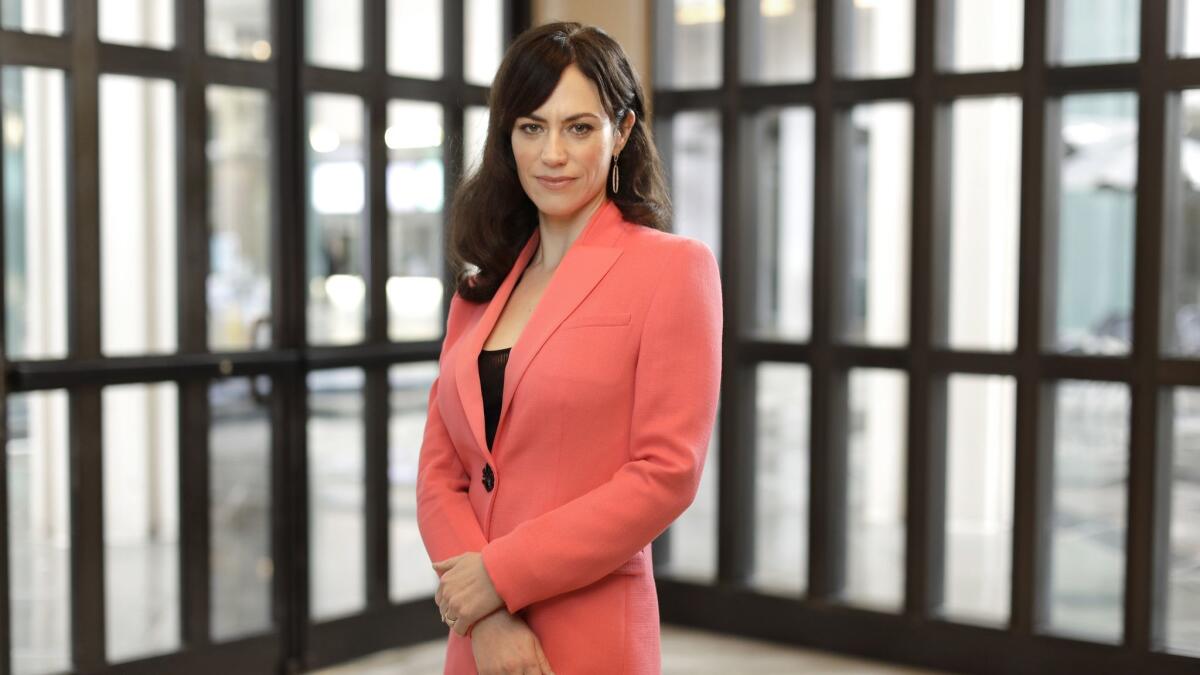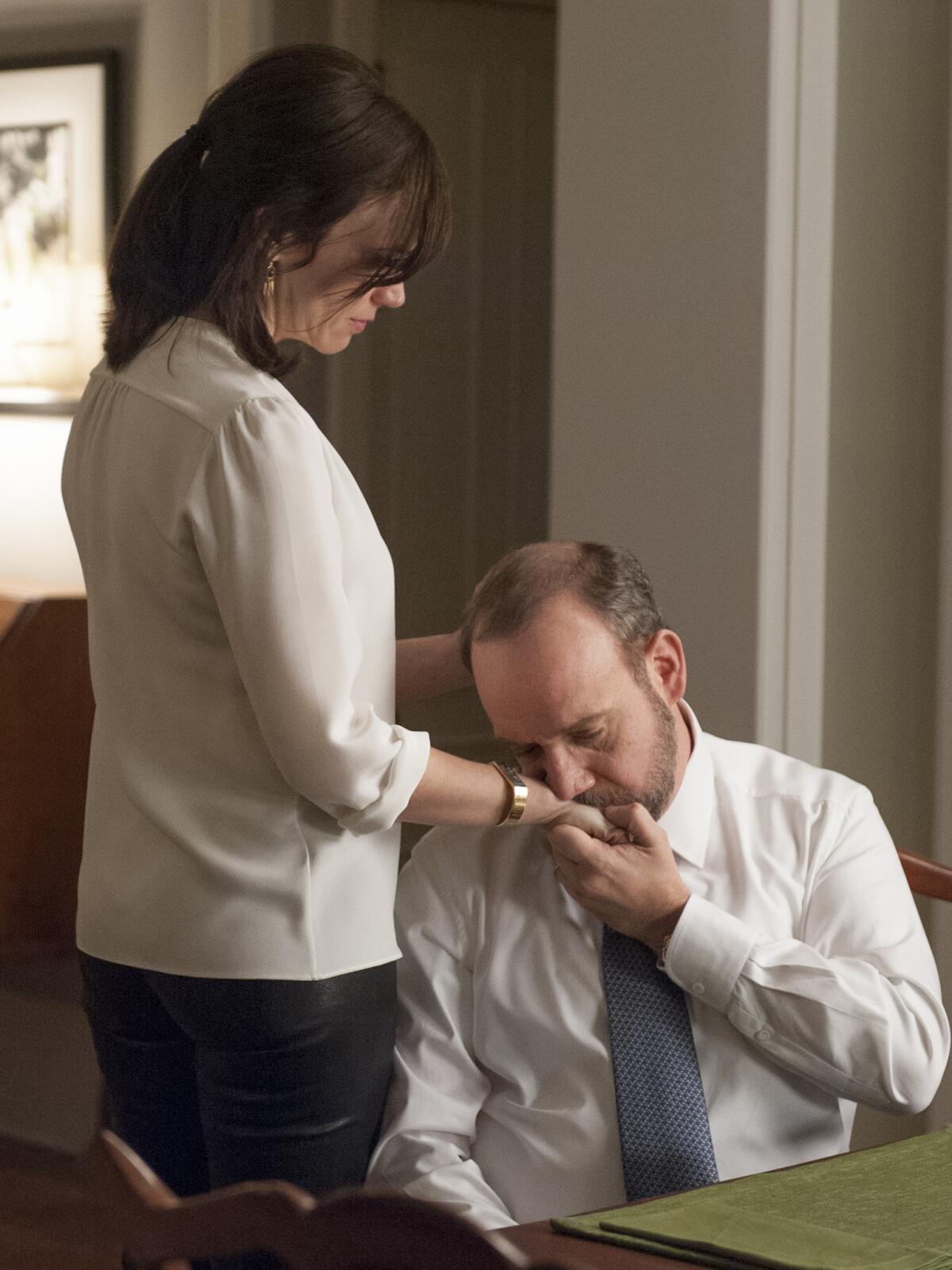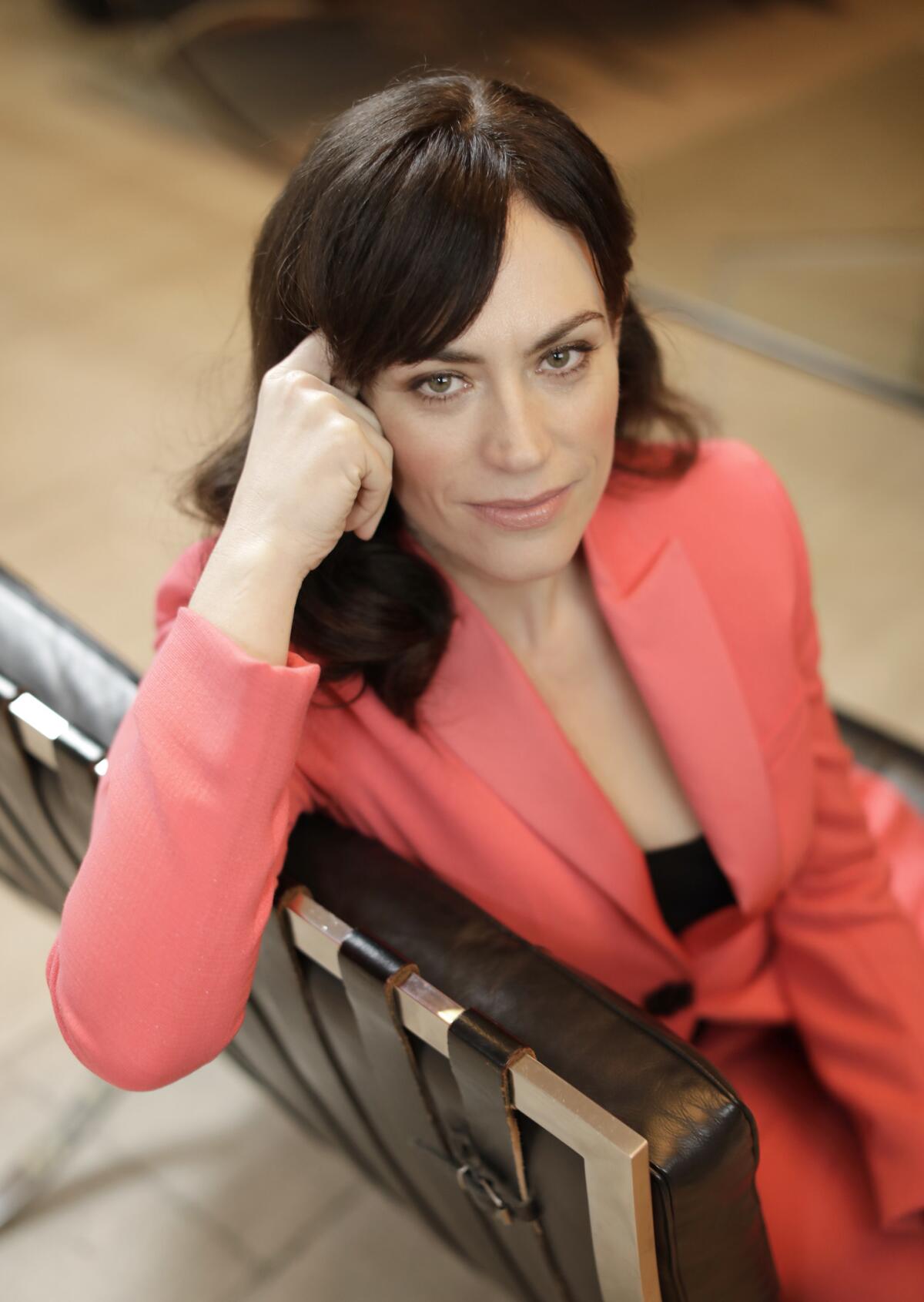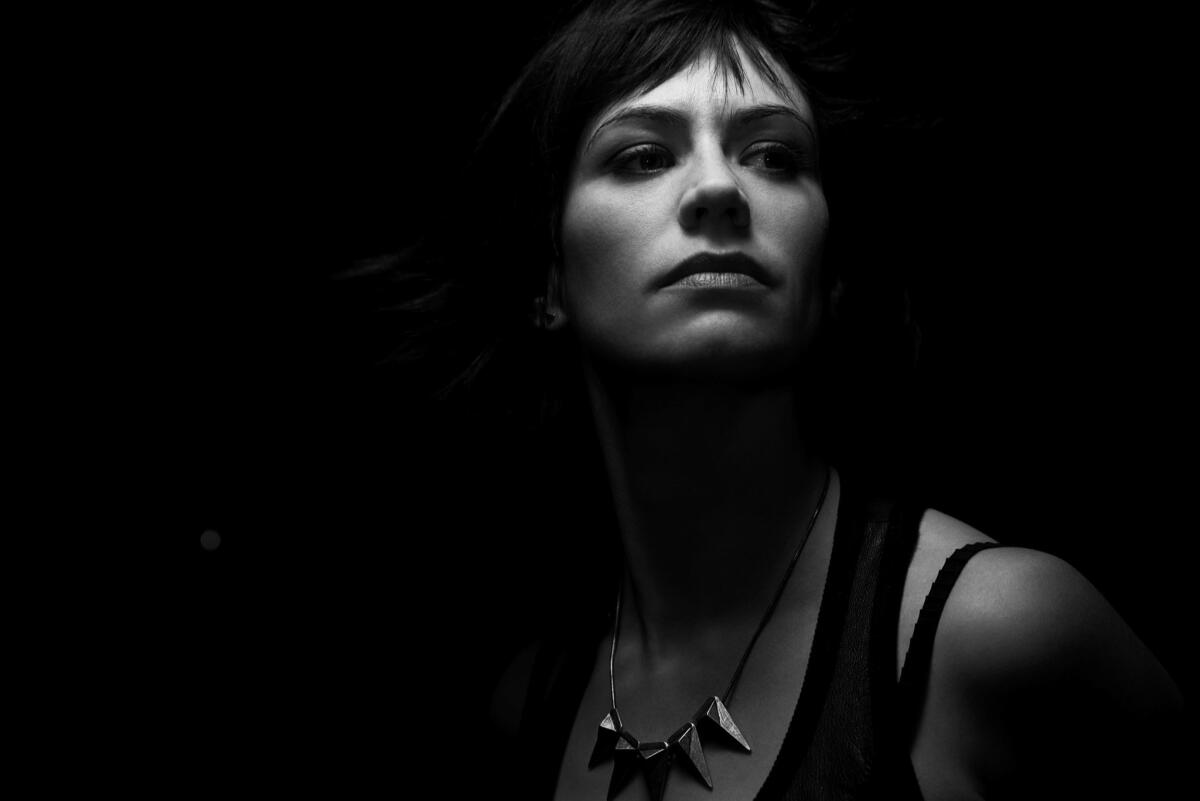Lawyers, kink and money: Maggie Siff finds her richest role yet in Showtime’s ‘Billions’

Ask “Billions” star Maggie Siff how she would feel if she all of a sudden became a billionaire, and you’ll likely hear a laugh tinged with a bit of discomfort.
“I would be a terrible billionaire,” she says. “It’s hard to wrap my mind around being someone who would be able to accumulate that much wealth. I think it’s fundamentally wrong for one person to have that much wealth. But people can do great things with that kind of wealth. Many people do, and I would hope to be one of them.”
Wendy Rhoades, the sensitive but stern corporate therapist and performance coach Siff plays in the Showtime drama “Billions,” might have some other answers to that question. She operates in a world of massive wealth, working for Axe Capital, the hedge fund headed by cocky billionaire Bobby “Axe” Axelrod (Damian Lewis).
That professional association has proved to be repeatedly problematic for Rhoades, who is married to bulldog U.S. Atty. Chuck Rhoades (Paul Giamatti), an enemy of financial corruption who has a singular objective — putting Axelrod behind bars.
Her loyalties are constantly at odds, and the blood feud puts Wendy in the middle of a vicious triangle where it appears only one of the men in her life will survive. In the latest episodes of the drama, she has increasingly found herself edging toward legal peril.
Currently in its third season, “Billions” has become one of the premium’s channels most popular series — second only to “Homeland” — while Wendy has become the latest in a gallery of strong characters Siff has played in elite TV dramas over the last decade. Among them: Rachel Menken, the department store heiress and mistress to ad man Don Draper (Jon Hamm) in “Mad Men,” and Tara Knowles, the “old lady” to biker club leader “Jax” Teller (Charlie Hunnam) in “Sons of Anarchy.”
Siff has shown that she knows how to make an entrance and an exit in those series. Fans of “Sons of Anarchy” have told her they still have not fully recovered from watching her being stabbed repeatedly in the head with a carving fork by Jax’s mother, Gemma (Katey Sagal), who suspected Tara of betraying her son.
And her first scene in “Billions” is probably one of the series’ most memorable. Wearing bondage gear and spiked heels, she “tortures” her bound-and-gagged husband — putting out a lighted cigarette on his chest and extinguishing the burn in a fashion that cannot be described in a family newspaper.
During a recent visit to Los Angeles, Siff discussed her affection for playing determined female characters in fictional settings of toxic masculinity, the art of acting out kinky sex scenes with Giamatti and who she thinks will be left standing in the vicious battle between her TV husband and “Axe.”
You play a character on “Billions” torn between two men who want to destroy each other. But you’re the one constant in their lives they can’t live without.

Our writers have been so smart in sustaining that dynamic. That was one of my biggest questions going in — how do you sustain that kind of triangle over time? The reckoning that Wendy has had over the past two seasons positions her to be back in partnership with both of them, but on her own terms. The thing I really appreciate about our writers and how they explore this triangle thing is that it’s not typical, not about cheating on anybody else. The way they come together and bend and grapple is unconventional.
But still, her loyalties are so deeply divided.
Something I’ve learned about Wendy is that she’s deeply compartmentalized. It’s her strength, and also her greatest weakness. She has blinders on to certain things, but I think what you see now is that things are starting to crack for her, physically. She now has her own struggle for survival, which leads her down a road of … well, let’s just say she doesn’t exactly have the moral high ground when we get to the middle of the season.
Is there a secret part of Wendy that’s in love with Axe? It seems that the combination of the two men in her life could add up to the perfect partner.
That’s an interesting way of looking at it. Initially, in the first season I thought there might be some unconscious romantic love. As I’ve come to understand it, I see it as more of a platonic love. There are things about Axe’s brilliance and his aggression that are attractive to her, but only in terms of exciting her as a friend, as a therapist, someone to work on.

Wendy’s wardrobe is pretty amazing.
She spends a lot of her money on clothing. We always talk about how her clothes are her armor, but always very sexy and tailored. There’s always a little zipper or something that points to the edge in her personal life, which I always appreciate. It’s like she’s having a little secret conversation with herself.
You’re becoming known for playing strong, confident women.
I go back and forth about it. I’m like the queen of toxic masculinity. All these series revolve around male egos and rage and competition and violence. I ask myself that question a lot, like, “Why am I always in the middle of these stories?” And I’m not entirely sure what the answer is. But I can speak to what I get out of it. I think I throw it into relief a bit. I think I play characters that stand in contrast of it, that have a little bit of perspective. I stand tall as it swirls around me. I care a lot about representations of women in film and television. I care a lot about playing women who are strong and intelligent. What I love about Wendy is that she’s as powerful as these men.

And she never backs down.
She doesn’t. There have been representations of powerful women who are shown as bitchy, like armor. Wendy is strong, she has many colors in her strength and confidence, a mastery. That’s unusual. I feel very proud of that.
The first scene of “Billions “ is quite memorable. What was it like doing that?
I was quite nervous about it. I had conversations with people before the job because I didn’t want to be the woman on the series who is scantily clad once an episode or baring it all. I was interested for character purposes, for what the implications of that were for her marriage. Everyone was on board for that, wanted me to be comfortable. Once I felt secure in that knowledge, I felt fine. It was also my first day working with Paul. I didn’t want to kill him with my 10-inch heels or the cigarette I was putting out on him. There were a lot of technical components, details that were extraordinarily nerve wracking. But we made it through and we laughed a lot.
I heard he fell asleep while he was tied up.
There was something about the way he was bound up, he was lying on the floor for a long time and he was relaxed. I was carrying the tension for both of us. For all of his relaxation, I was that wakeful.
The world “Billions” is set in couldn’t be more different from that of “Sons of Anarchy.”
“Sons” struck such a note on our culture, into Middle America, what we probably would now call Trumpland. All of the extras on our set were from sober bike clubs. I ended up feeling so grateful for the exposure to parts of our culture that I, growing up in New York and living between the coasts, would have never been exposed to.

For all the testosterone, the drama was also very popular with women.
The matriarch [Gemma] was so strong. And Tara. No matter how far afield these men go, no matter how hateful and how much blood is shed, they always come home to their mamas, to their old ladies. The passion for family was at the center of that show. It was a brotherhood but also a passionate family drama. Men and women could groove with that; there was something for everybody. And women love bad boys. There is something about the cult of the bad boy, someone who deep down has a heart of gold but can’t quite get it together.
So let’s talk about that death scene . . .
I get a lot of people coming to me and saying they couldn’t watch the show anymore after that, or telling me exactly where they were when they saw it, screaming at the television.
What was your reaction?
Everything on that show was so over the top. My basic reaction was, “If you’re going to go out on ‘Sons of Anarchy,’ you might as well go in a blaze of glory.” In the mind of [creator] Kurt Sutter, that means acts of spectacular violence. Although it was horrific, I also knew there would be great beauty on some level. It was one of the most heartbreaking moments on that show. Everyone is so destroyed. There was this investment in this story of Jax and Tara. It wasn’t about me. It was about their love.
You’ve had quite a run on all these great shows, playing these complex characters.
I’m so proud of the work I’ve done on all these shows, grateful that I’ve gotten to work with such great writers who tell facilitating and profound stories. I feel proud to be the woman who stands up in all these proud male stories. I don’t want to sound ungrateful, but I really want to tell women’s stories. I want to support female writers and directors. I hope my career will include more of that. That’s not to diminish the work that I’ve done. It’s just made me clear-eyed about my ambitions to the future in that regard.
OVERTIME QUESTION:
What do you watch?
I”m a big fan of Jill Soloway, so I watch “Transparent” and “I Love Dick.” I loved “Togetherness.” I watch “Game of Thrones,” “Orange Is the New Black.” I haven’t gotten to “The Handmaid’s Tale” yet, but it’s in my queue.
ALSO
The complete guide to home viewing
Get Screen Gab for everything about the TV shows and streaming movies everyone’s talking about.
You may occasionally receive promotional content from the Los Angeles Times.




